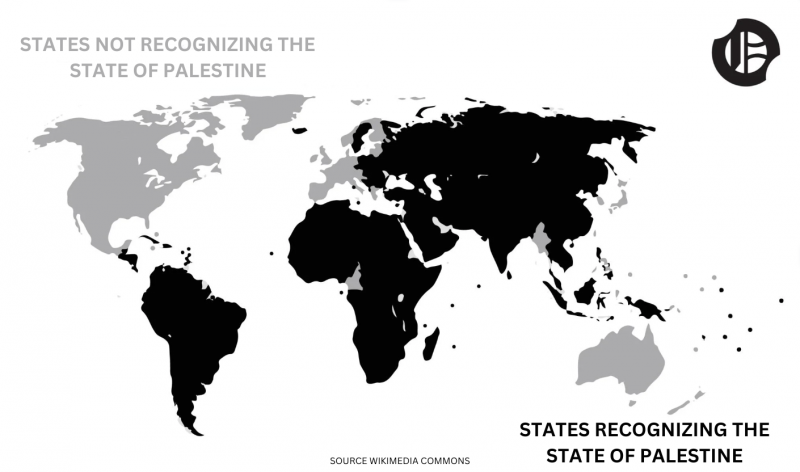
Map showing which countries have recognized the State of Palestine.
Amid the Gaza war, the idea of officially recognizing Palestine as a state is becoming evident in the West, even in some unexpected countries. The United States, Israel’s staunch ally, is considering options to recognize a potential Palestinian state at the end of the war, Axios reported Wednesday.
Two days earlier, UK Foreign Secretary David Cameron made a similar statement, underlining the “responsibility” to make progress towards ending the Israel-Palestine conflict.
Some perceive these developments as a turning point, but are they really? What exactly would recognizing a Palestinian state mean?
Which countries recognize Palestine?
In 1988, shortly before the second Intifada, Yasser Arafat, then chairman of the Palestine Liberation Organization’s Executive Committee, proclaimed the State of Palestine, comprising the Gaza Strip and the West Bank, with East Jerusalem as its capital.
Following the Declaration of Independence by the Palestine National Council (PNC) on Nov. 15, 1988, in Algiers, 85 countries recognized this new Palestinian state, including most Arab countries. Others followed suit in the following decades, as a result of bilateral diplomatic efforts.
To date, 139 UN member states have recognized the sovereignty of Palestine. The majority are countries of the South and East.
In 2014, Sweden became the first country in the West to recognize Palestine, after joining the European Union (EU). Eight other EU Member States recognized Palestine before joining the EU, including Malta, Cyprus and several Eastern European countries. Outside the EU, Iceland and the Vatican officially recognize the state of Palestine.
Palestine has been granted a non-member observer status of the UN since 2012. While this does not give it voting rights in the General Assembly, it does give Palestinians the opportunity to join UN agencies such as the World Health Organization (WHO). Thanks to this status, Palestine was admitted to the International Criminal Court (ICC) in 2015, the only permanent international court that can prosecute individuals for war crimes.
What does this recognition mean?
The recognition of Palestine is primarily a political decision, as it is not conditioned on the establishment of bilateral relations. The US and other Western countries (the majority of EU countries, Canada, South Korea, Japan, Australia and New Zealand) do not recognize the State of Palestine but maintain official relations with the Palestinian Authority (PA) in Ramallah, which is recognized by the Israeli government under the Oslo Accords in 1993 as the legitimate representative of the Palestinian people.
Today, recognition of a Palestinian state remains mainly symbolic. It cannot, on its own, bring about fair and equitable solutions on borders, security, the return of refugees, the status of Jerusalem, access to water and economic relations.
Observers believe that as long as Palestine remains an occupied and fragmented territory, in the absence of pressure and sanctions against the violations committed by Israel, even a massive recognition of a Palestinian state will have little effect on the daily lives of the population. Despite this observation, the recognition of a Palestinian state remains an essential step toward achieving these objectives and building a peaceful future in the Middle East.
What is stopping other states from recognizing Palestine?
For some countries, it is about clear support for Israel. This is the case for Germany, which has always opposed the creation of a Palestinian state, at least more strongly than most of its European neighbors. In 2014, Chancellor Angela Merkel officially spoke out against “unilateral recognition of the Palestinian state,” adding that “a unilateral recognition of the Palestinian state would not move us forward on the way to a two-state solution.”
But there is also a certain discouragement, given the little impact that followed the recognition of Palestine by certain countries. For example, the social democrats who supported the project in Sweden when they were in power have admitted that their decision had no impact,. On the contrary, it led to a freeze in relations between Israel and Sweden. In a bid to improve relations, the country’s right and far-right coalition government is now pursuing a distinctly pro-Israeli policy.
In the end, only a country with a diplomatic reach like that of the United States could pave the way for such a decision.
“The US recognition of Palestine would now make diplomatic and political sense, especially since Mr. Biden's national security team is devising a plan for Gaza after the conflict that was sparked by the Oct. 7 Hamas attack on Israel,” wrote former adviser to President Obama’s special envoy for the Middle East Peace Process, David Harden, and USAID mission director to the West Bank and Gaza Larry Garber in a New York Times article published in December.
In the context of the war in Gaza, Axios’ revelations about a possible US plan to recognize Palestine could reflect Biden’s desire to exert pressure on the Netanyahu cabinet, whose conduct of the war has led to at least 26,900 deaths in Gaza, according to the Gaza health authority, causing great frustration within the US administration.
This article was originally published in French in L'Orient-Le Jour. Translation by Joelle El Khoury.